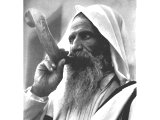head covering = long hair
20-11-2011 - Posted by Andre Piet
Following the seminar of Sunday, June 14, 2009, someone presented me with this question: How can Paul, as a Jew, say (1 Cor.11:4,7) that it is a disgrace for a man to pray or prophesy with his head covered? Is it not a special custom of Jewish men, when they engage in spiritual activities, to have their head covered with tallit or a yarmulke? I would like to use this blog to fill this hiatus in the study. Was Paul, when speaking of a head covering, referring to a cloth, a yarmulka, hat or cap, that would mean that He had directly turned himself against a well-established, Jewish customs. This is not the case, since just a few verses earlier Paul even had insisted:
And become not a stumbling block to Jews as well as to Greeks and to the ecclesia of God, 1 Cor.10:32
Would Paul, with the words of 1 Corinthians 11:4,7, be really opposing a custom within the Jewish society? Is the tenor and content of the previous chapter not showing that, with respect to cultural traditions, Paul was prepared to adjust himself to everything? Or would Paul, perhaps be referring to an entirely different kind of head covering? That indeed we are to think in this latest direction, is evident from what Paul wrote a few verses later:
13 Judge in yourselves: Is it becoming in a woman to be praying to God uncovered? 14 Is not even nature itself teaching you that if a man, indeed, should have tresses, it is a dishonor to him, 15 yet if a woman should have tresses, it is her glory, seeing that tresses have been given her instead of clothing? (CLV)
Aha! Paul is not talking about an artificial head covering, but about hairstyles! Long hair functions as a veil. By the way, the word Paul used for “cover”, literally means “downward covering”, which underlines the association with “long hair”. Did Paul, in general, say that it was a dishonor for a man to wear “long hair as a woman” (cp Rev.9:8), for someone “praying and prophesying” (as still happened in those days; 1Cor.13:8), it was definitely inappropriate. If a man prayed and prophesied having long hair, he revealed himself as a woman. And conversely, a woman who prayed or prophesied, having short hair, revealed herself as a man. As a rule (worldwide), long hair for a woman is considered to be her honor and glory. Paul argues that where a woman does things normally reserved for men* (“pray and prophesy”), that then she is to take her place by having “authority” (a veil = long hair) on her head. Judge for yourself… —————————————- * The man is a type of “the image and glory of God” (=Christ). Of the Creator. The woman is a type of creation. During the seminar, these things have been discussed in greater detail. part 1 part 2 ——————————— translation: Peter Feddema ![]()

 English Blog
English Blog